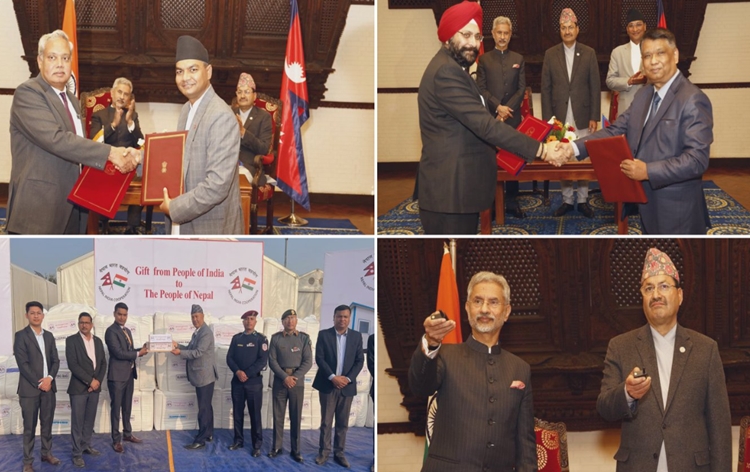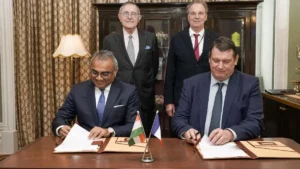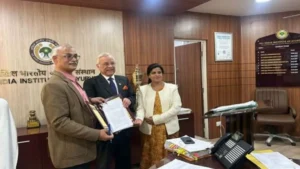External Affairs Minister S Jaishankar, currently on a two-day visit to Nepal, joined hands with his counterpart N P Saud to inaugurate three cross-border transmission lines. This marks a significant stride in enhancing connectivity between the two nations, fostering cooperation in the energy sector.
Bilateral Agreement for 10,000 MW Power Export: A Decade-Long Commitment
India and Nepal solidified their commitment to a long-term energy partnership with the signing of an agreement for the export of 10,000 MW of power to India over the next 10 years. The bilateral agreement, signed by India’s Energy Secretary Pankaj Agrawal and Nepal’s Energy Secretary Gopal Sigdel, is a testament to the shared vision of sustainable energy cooperation.
Key Developments at the 7th Nepal-India Joint Commission Meeting
The power export agreement was a highlight of the 7th meeting of the Nepal-India Joint Commission. The discussions encompassed various facets of bilateral ties, emphasizing trade and economic relations, connectivity projects, defence and security cooperation, agriculture, disaster management, tourism, and more. This meeting served as a platform for both nations to reaffirm their commitment to an all-encompassing and robust partnership.
Cooperation in Renewable Energy: Strengthening Commitment to Sustainability
In addition to the power export agreement, an Memorandum of Understanding (MoU) for cooperation in renewable energy was signed between the Nepal Electricity Authority and India’s National Thermal Power Corporation Limited. This underscores the joint commitment towards sustainable and eco-friendly energy solutions.
Nepal’s Perspective: A Breakthrough in the Power Sector
Nepal’s Prime Minister, Pushpa Kamal Dahal Prachanda, hailed the power export agreement as a breakthrough in the nation’s power sector. The significance of this agreement is not only economic but also pivotal in ensuring energy security and fostering a balanced and sustainable development trajectory for Nepal.
Comprehensive Discussion on Bilateral Relations
External Affairs Minister Jaishankar highlighted the breadth of discussions during his visit, covering a spectrum of topics such as land, rail, and air connectivity, cooperation in defence and security, agriculture, power, water resources, disaster management, tourism, civil aviation, and people-to-people and cultural exchange. These discussions underscore the multifaceted nature of the India-Nepal relationship.
Important Questions Related to Exams
Q1. Who inaugurated three cross-border transmission lines during a two-day visit to Nepal?
a. Nepal Prime Minister Prachanda
b. India’s Energy Secretary Pankaj Agrawal
c. External Affairs Minister S Jaishankar (Correct Answer)
d. Nepal’s Energy Secretary Gopal Sigdel
Q2. What does the bilateral agreement signed between India and Nepal entail?
a. Trade and economic cooperation
b. Cultural exchange programs
c. Export of 10,000 MW of power to India over the next 10 years (Correct Answer)
d. Joint military exercises
Q3. Which key officials signed the power export agreement between India and Nepal?
a. Prime Ministers of both nations
b. External Affairs Ministers
c. Energy Secretaries – Pankaj Agrawal (India) and Gopal Sigdel (Nepal) (Correct Answer)
d. National Thermal Power Corporation Limited representatives
Q4. What was a highlight of the 7th Nepal-India Joint Commission Meeting?
a. Cultural exchange programs
b. Bilateral trade agreements
c. Power export agreement (Correct Answer)
d. Joint military exercises
Q5. Besides the power export agreement, what additional agreement was signed during the visit?
a. Defence cooperation pact
b. Memorandum of Understanding (MoU) for cooperation in renewable energy
c. Trade and investment partnership
d. Cross-border transportation agreement
Kindly share your responses in the comment section.




 Why the Adani-Marseille Pact Could Be a ...
Why the Adani-Marseille Pact Could Be a ...
 AIIA Signs MoU with General Insurance Co...
AIIA Signs MoU with General Insurance Co...
 Bharat Taxi Partners with AAI to Launch ...
Bharat Taxi Partners with AAI to Launch ...








